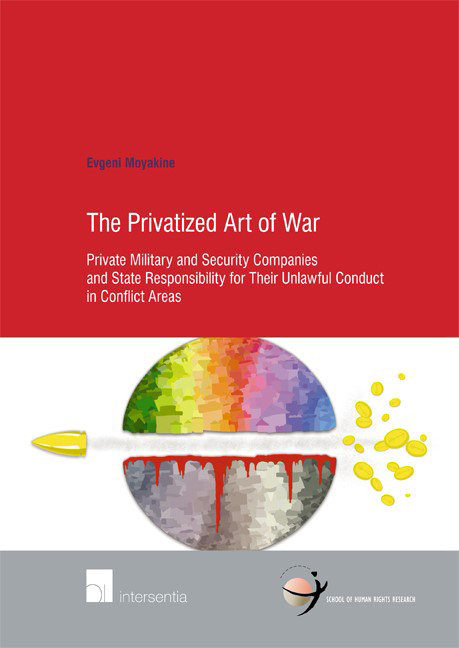 The Privatized Art of War
The Privatized Art of War Book contents
- Frontmatter
- Dedication
- Acknowledgments
- Contents
- List of Abbreviations
- Chapter I General Introduction
- Chapter II Privatization of War and Security – War is Business and Vice Versa
- Chapter III Existing Legal Framework of PMSC Operation
- Chapter IV Legal Status of PMSC Employees
- Chapter V State Responsibility under the Draft Articles on State Responsibility
- Chapter VI State Responsibility for Non-Compliance with Positive International Law Obligations
- Chapter VII Summary, Overall Conclusions, and Final Observations
- Dutch Summary — Nederlandse Samenvatting
- Russian Summary — KPATKOE COДEPЖAHИE KHИГИ HA PУCCKOM ЯэЬІKE
- Selected Bibliography
- Table of Cases
- Selected United Nations Documents
- Index
- Curriculum Vitae
- School of Human Rights Research Series
Chapter IV - Legal Status of PMSC Employees
Published online by Cambridge University Press: 28 November 2017
- Frontmatter
- Dedication
- Acknowledgments
- Contents
- List of Abbreviations
- Chapter I General Introduction
- Chapter II Privatization of War and Security – War is Business and Vice Versa
- Chapter III Existing Legal Framework of PMSC Operation
- Chapter IV Legal Status of PMSC Employees
- Chapter V State Responsibility under the Draft Articles on State Responsibility
- Chapter VI State Responsibility for Non-Compliance with Positive International Law Obligations
- Chapter VII Summary, Overall Conclusions, and Final Observations
- Dutch Summary — Nederlandse Samenvatting
- Russian Summary — KPATKOE COДEPЖAHИE KHИГИ HA PУCCKOM ЯэЬІKE
- Selected Bibliography
- Table of Cases
- Selected United Nations Documents
- Index
- Curriculum Vitae
- School of Human Rights Research Series
Summary
It is sometimes stated that PMCs/PSCs have no status under international law… From an international humanitarian law point of view this assertion is misleading.
Emanuela-Chiara GillardINTRODUCTION
In Chapter II of this study, PMSCs themselves as corporate entities have been scrutinized. It is, however, important to also examine members of their personnel, whose legal status in armed conflicts appears to be quite ambiguous and controversial from the perspective of the law of armed conflict. The assessment of the legal status from the point of view of international law is a crucial step to be taken in the course of analyzing possible relationships between States and PMSCs, which may influence the determination of State responsibility and its scope for the unlawful actions of PMSCs, and examination of a set of positive obligations of the States arising out of international humanitarian and human rights law. This Chapter will include analysis of the legal status of employees working for PMSCs and carrying out their tasks in the situations of armed conflict, focusing on the legal consequences of that classification under international humanitarian law and its relevance for the application of the doctrine of State responsibility. In this regard, it will consider the participation of PMSCs in both international and non-international armed conflicts.
LEGAL STATUS OF PMSC PERSONNEL AND STATE RESPONSIBILITY
The factual legal status of PMSC personnel is perhaps the area where the greatest concern lies regarding their rights, duties, and immunities on a mission. A number of fundamental questions can be posed with regard to the position of the employees working for PMSCs in conflict areas. What is the legal status of military and security experts as members of the PMSC personnel under international humanitarian law? How does the nature of an armed conflict - international or non-international - affect this legal qualification? Can those individuals be attacked during the hostilities and do adversary powers have to treat them as prisoners of war if captured? Do they enjoy privileges and protection as civilians on the battlefield? There is no straightforward answer to all those questions and it becomes apparent that circumstances under which PMSCs operate require a careful examination from the perspective of the law of armed conflict.
- Type
- Chapter
- Information
- The Privatized Art of WarPrivate Military and Security Companies and State Responsibility for Their Unlawful Conduct in Conflict Areas, pp. 157 - 200Publisher: IntersentiaPrint publication year: 2015
